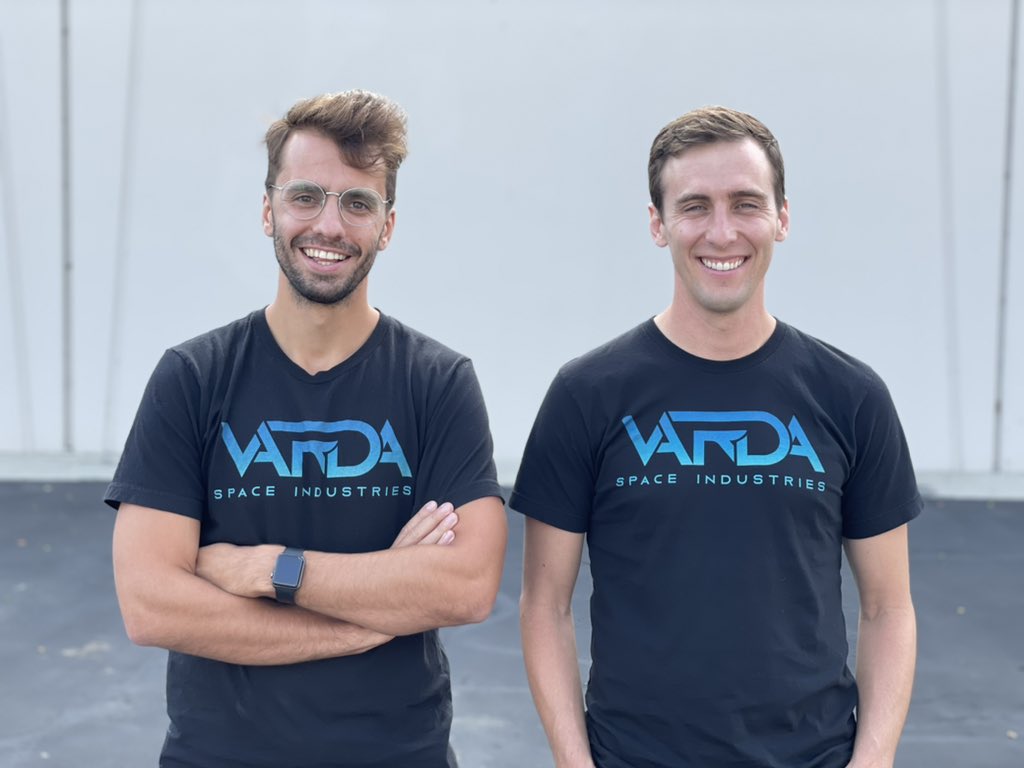Varda House Industries has closed a significant tranche of funding simply weeks after its first drug capsule returned from orbit.
The $90 million Collection B spherical marks an inflection level for the corporate, which is now getting ready to scale from an preliminary demonstration mission to an everyday set of buyer payload missions, Varda founder Delian Asparukhov advised TechCrunch.
Headquartered in El Segundo, Varda was based in 2021 by Asparukhov, who can be a Founders Fund accomplice, and Will Bruey, a spacecraft engineer who started his profession at SpaceX. The pair had an audacious purpose to commercialize what till not too long ago had been promising however finally small-scale analysis into the consequences of microgravity on pharmaceutical crystals.
Certainly, Varda’s first mission, who returned to Earth in February after 10 months in orbit, this isn’t the primary time a drug has crystallized in microgravity. Astronauts have been conducting protein crystallization experiments in house for many years on the Worldwide House Station and, earlier than that, on the House Shuttle.
However the enterprise case for increasing this analysis has by no means materialized—till now. This occurs for a number of causes, Asparchow defined: Due to the crew, there are vital restrictions on the kinds of solvents or different supplies that may be taken on board the ISS; there are restrictions associated to mental property on the work going down on the plant; and pharmaceutical laboratory gear designed to be used in house was typically inferior to ground-based variations.
However rather a lot has modified, particularly within the house business. A part of the rationale Varda is feasible immediately is because of the availability of normal, low-cost SpaceX launches and Rocket Lab’s innovation in satellite tv for pc bus manufacturing. Even past these exterior partnerships, the startup has seen vital success in its personal proper, as demonstrated by the success of the primary mission: their return capsule appeared to work flawlessly, and an experiment to reformulate the antiviral drug Ritonavir was carried out with no hitch.
Varda additionally started publishing the outcomes of its inside analysis and growth, together with Analysis Article on its hypergravity (versus microgravity) crystallization platform, which the startup developed as a type of testing methodology earlier than sending medicine into house. It is a fully new space of analysis that takes benefit of the chance to really uncover gravity as a variable in scientific experiments.

Picture credit: Varda House Industries (Opens in a brand new window)
“Over time, we will generate knowledge units between hypergravity and microgravity and start to indicate correlations,” he mentioned. “As Varda flies increasingly, we’re assured that we are going to start to develop methods of thought wherein, for the patterns of sure kinds of chemical methods, hypergravity might be used as a option to decide the correlation between, finally, microgravity and the effectiveness of the drug.”
There may be nonetheless lots of work forward. Whereas engineers will examine this primary spacecraft, known as Winnebago, to know its stage of wear and tear and tear, the corporate as a complete will focus extra on cadence moderately than reusability, he mentioned.
“For those who simply amortize the general price of doing enterprise, we’ll get much more out of it if we initially improve the frequency of flights earlier than we truly go into reuse. In some methods, it is like we have to transfer to a once-a-month frequency earlier than the flexibility to re-engage customers turns into our greatest lever.”
Varda does goal to considerably cut back mission prices by repairing and reusing Winnebago capsules, as SpaceX is doing with its Dragon capsule, however Asparchuw mentioned that will not occur till the tip of the last decade, round 2027.In a current podcast lookHe clarified that the full preliminary price of the mission is about $12 million, which can drop to $5-6 million for Mission 4 and $2.5 million or much less for Mission 10.) Bigger capsules are additionally in growth in the long run, although and never till 2027.
Asparchuw additionally confirmed that prescribed drugs might be Varda’s sole focus for the subsequent 10-20 (or extra) years, as the corporate is satisfied that pharmaceutical merchandise will present higher financial worth in comparison with different supplies. A lot of this comes right down to the truth that there are a big set of medication that solely require a “seed” of fabric that may solely be made in microgravity, and the remainder of the drug formulation will be accomplished right here on Earth. Because of this the product has excessive yield however low weight.
The corporate can be trying to enhance the technological capabilities of the onboard pharmaceutical reactor. The primary mission carried just one drug protein, however sooner or later the corporate hopes to course of a number of medicine that may be subjected to completely different processing regimens. Sooner or later, different missions will be capable to carry bigger reactors for medicine that truly want greater than only a “seed” crystal, and these mission profiles might be nearer to one thing like mass manufacturing.
Varda has “a number of” contracts signed with public biotech firms, and the subsequent three missions have already been accomplished with Rocket Lab, which offered the spacecraft bus for the primary mission. The startup’s subsequent manufacturing mission will launch later this yr, and the group plans to make it occur. spaceship in Australia.
The brand new funding was led by Caffeinated Capital with participation from Lux Capital, Common Catalyst, Founders Fund and Khosla Ventures. Varda has raised $145 million to this point.
